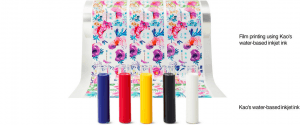KAO Receives GSC Awards in Japan
Back to NewsKao’s Development of Water-Based Inkjet Ink for Food Package Receives the Minister of Economy, Trade and Industry Award in the 18th Green & Sustainable Chemistry (GSC) Awards in Japan
Kao Corporation has received the Minister of Economy, Trade and Industry Award in the 18th Green & Sustainable Chemistry (GSC) Awards for the development of water-based inkjet ink for food package. This technology makes it possible to print on flexible packaging film for food products with water-based inkjet ink.
The GSC Awards are one of the activities of the Green & Sustainable Chemistry Network, Japan*1 . The GSC Awards are granted to individuals, groups or companies that have greatly contributed to promoting GSC through their research, development and industrialization in fields such as industrial technology development, decreasing environmental impacts including carbon dioxide emissions, waste, landfill use and harmful by-products, and establishing new philosophies and methodologies in research fields.
* 1 Voluntary organization for effectively and persuasively promoting green and sustainable chemistry activities in Japan. Currently conducts activities within the Japan Association for Chemical Innovation (JACI) as the Green & Sustainable Chemistry Network, Japan (GSCN).

Background and overview of the award-winning research
Traditionally, oil-based inks that use organic solvents able to dry quickly and produce high-quality printing have been used for printing on flexible packaging film. These inks emit a large amount of volatile organic compounds (VOCs) during the printing process. Their impacts on the labor environment for workers and on the global environment have been a cause of concern.
In March 2016, Kao developed water-based inkjet ink called LUNAJET for printing flexible packaging film that features a VOC-free design* 2 . It offered a new value of reduced environmental impacts to the ink market for industrial printing applications. This ink was adopted by a leading Japanese food manufacturer in 2018 for its snack packaging, which drew a great deal of industry attention.
* 2 “VOC-free” means the amount of VOCs emitted during the printing process is less than 700 ppmC (in carbon conversion terms)
LUNAJET features
- A VOC-free design to improve the labor environment for workers as well as to reduce global environmental impacts.
- Applies Kao’s proprietary nano-dispersion technology to disperse pigments.
- A water-based ink able to print on film and metal.
Kao will continue to use this technology with the aim of contributing to solutions for social issues by deepening essential research combining and integrating the findings collected to date and by advancing development of products and services that contribute to reducing environmental impacts.
About Kao
Kao creates high-value-added products that enrich the lives of consumers around the world. Through its portfolio of over 20 leading brands such as Attack, Bioré, Goldwell, Jergens, John Frieda, Kanebo, Laurier, Merries and Molton Brown, Kao is part of the everyday lives of people in Asia, Oceania, North America and Europe. Combined with its chemical division, which contributes to a wide range of industries, Kao generates about 1,500 billion yen in annual sales. Kao employs about 33,000 people worldwide and has 130 years of history in innovation.